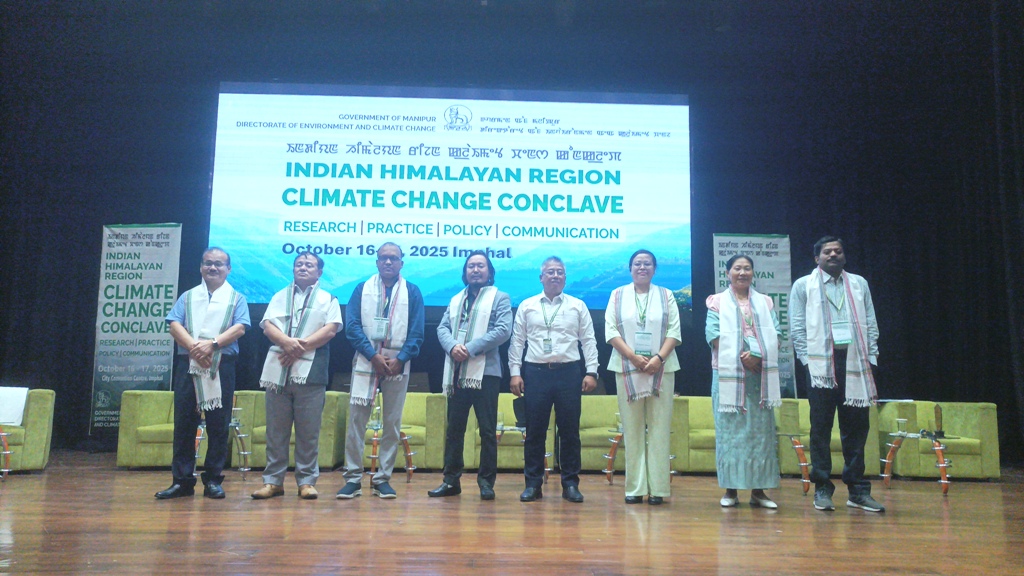A two-day Indian Himalayan Region (IHR) Climate Change Conclave was inaugurated in Imphal.
Share

IMPHAL — A two-day Indian Himalayan Region (IHR) Climate Change Conclave on the theme “Perspectives of research, practice, policy, and communication” was inaugurated in Imphal under the aegis of the Directorate of Environment and Climate Change (DoECC) on Thursday to chart a roadmap for enhancing climate resilience in the Indian Himalayan region spread across 12 states.
Inaugurating the conclave, Manipur Chief Secretary Dr. Puneet Kumar Goel said the event marks an important step toward strengthening collaboration among the Himalayan states of India to address challenges posed by climate change and promote sustainable development.
Dr. Goel said the government is managing and conserving five major wetlands — Yaral Pat, Utra Pat, Zaimeng Lake, Waithou-Pumlen-Koidum Pat, and Loktak Lake — as part of its nature-based solutions to mitigate climate change impacts.
Appreciating the proactive efforts of the DoECC in implementing various pilot projects integrating traditional knowledge and practices to strengthen community resilience, he expressed hope that the conclave would provide valuable recommendations and strengthen collective efforts to conserve and protect the Himalayan environment.
Also read: St. Xavier College Senapati students complete month-long internship
Principal Secretary (Forest, Environment and Climate Change) Arun Kumar Sinha was also present during the inaugural session of the conclave, which will be structured around four interrelated thematic sessions — research, practice, policy, and communication — to address the complex dimensions of climate change in the IHR.
In the day’s first technical session on “Advancing scientific understanding of climate change in the Himalayas”, the opening talk on recent climate research in the Himalayan region was delivered by Prof. (retd.) Dr. NH Ravindranath of IISc Bengaluru.
State representatives Dr. Suresh C. Attri (Himachal Pradesh), Subrata B Dutta (West Bengal), and Dr. Majid Farooq (Jammu and Kashmir), along with experts Dr. H Nanaocha Sharma (Institute of Bio-resources and Sustainable Development), Prof. L Nabachandra Singh (Central Agricultural University), and Dr. Wazir Alam (Manipur University), besides Director (Horticulture) K Debadutta Sharma and Nodal Officer (MOVCDNER) Kh. Nimaichand Singh, shared their presentations on ITK integration, biodiversity, and related topics.
The second session on “Climate-resilient practices” opened with a talk on climate adaptation practices at the IHR by Chief Scientist (CSIR-NEIST) Dr. H Birkumar Singh and continued with discussions on community-led adaptation and resilience models, sustainable lifestyles, circular waste management, and innovative solutions in agriculture, forestry, and energy through nature-based approaches.
Panellists in the session included D Dohu Robin (Arunachal Pradesh), Susanta Banik (Tripura), and Kekuneillutu (Nagaland), alongside experts Dr. Rameshori Yumnam (Manipur University), Thingreiphi Lungharwoshi (Mountain Indigenous Knowledge Centre), and Mukesh Patil (ACWADAM, Pune).
Government officials, scientists, researchers, policymakers, and representatives from various Indian Himalayan states and line departments were also present at the event.
The conclave will conclude with a series of discussions and a valedictory session to be attended by Governor Ajay Kumar Bhalla on October 17.